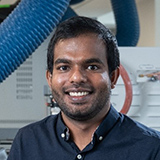Developing technologies for remote rehabilitation monitoring
Around 15% of the global population suffer from some form of a disability.
Supporting these people through rehabilitation care has become very important as there is increasing pressure on the healthcare systems globally due to pandemics, global political issues, poverty and rapid population growth.
However, health services for rehabilitation are almost non-existent or desperately under-resourced in many countries around the world.
Our research focuses on developing new and efficient technologies for remote rehabilitation monitoring, which could significantly increase healthcare access and facilitate maximum utilization of available healthcare resources.
The focus of our work is to develop smart textile solutions similar to regular clothing at low cost, high sensing accuracy, comfort and long-term wearability. Every time we move, we generate power. Harvesting some of this energy would provide each of us with our very own sustainable and portable energy source. This idea is now becoming a reality and making sure it does is the focus of our most recent research project.
Research in focus
Developing smart-textiles
We mainly focus on developing wearable sensor-integrated smart textiles which can monitor movements of targeted parts of the body and remotely transmit that information to healthcare professionals. Rehabilitation practitioners can then use this information to provide necessary advice and interventions to enhance the progress of the patient.
We are exploring “super-smart textiles” that can capture energy from the wearer’s movement to support self-powered health monitoring. This kind of technology will be developed to assess various conditions – including movement disorders, knee osteoarthritis, sports and other injuries – and support the rehabilitation processes.
Research outputs
- Dudem B, Dharmasena RIG, Graham SA, Leem JW, Patnam H, Mule AR, Silva SRP, Yu JS. (2020). Exploring the theoretical and experimental optimization of high-performance triboelectric nanogenerators using microarchitectured silk cocoon films. Nano Energy, 74, p.104882. DOI: 10.1016/j.nanoen.2020.104882
- Gunawardhana KS, Wanasekara ND, Wijayantha KG, Dharmasena RI. (2022). Scalable Textile Manufacturing Methods for Fabricating Triboelectric Nanogenerators with Balanced Electrical and Wearable Properties. ACS applied electronic materials, 4(2), pp.678-688. DOI: 10.1021/acsaelm.1c01095
- Dharmasena RDIG, Jayawardena KDGI, Mills CA, Deane JHB, Anguita JV, Dorey RA, Silva SRP. (2017). Triboelectric nanogenerators: providing a fundamental framework. Energy & Environmental Science, 10(8), pp.1801-1811. DOI: 10.1039/C7EE01139C
Meet the experts
Dr Ishara Dharmasena is a Royal Academy of Engineering Research Fellow and a Lecturer at Loughborough University.
He received his BSc (Engineering) degree from University of Moratuwa (2014) and PhD from University of Surrey specializing in triboelectric energy harvesting and wearable electronics (2019). He previously worked as a EPSRC Doctoral Prize Fellow at the Wolfson School, Loughborough University (2019-2021) and as a Research Fellow on TENG Energy Harvesting at the University of Surrey (2019).
Ishara has extensive experience in smart textiles and nanotechnology industries, working as a Research Scientist at Sri Lanka Institute of Nanotechnology and working in several leading textiles companies in South Asia. His current research interests include smart textiles, energy harvesting, triboelectric nanogenerators, wearable and flexible electronics.
We collaborate with a number of academic and industrial partners and happy to collaborate with industries and academics in the UK and worldwide.
